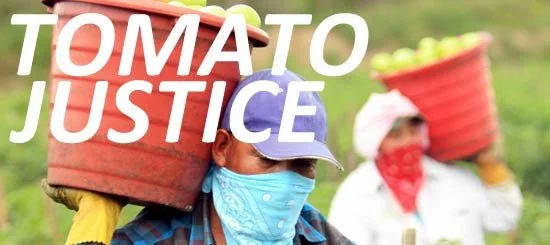Update on Tomato Justice
It’s been about two months since “Tomato Justice” came out, telling the stories of those who pick tomatoes in Immokalee, Florida, and what it has to do with us. Based on feedback, it was well-received by the Coalition of Immokalee Workers and their partners. And perhaps best of all, Wilson, the farmworker I interviewed, sent a copy to his family back in Guatemala.
It’s been encouraging to get this feedback and to see the story picked up in various places, like FoodFirst.org, the Campolo College of Graduate and Professional Studies blog, and the “Fair Food” section of the Presbyterian Church (USA) website.
Just the other day I heard that International Justice Mission has launched Recipe for Change, its own campaign for slave-free tomatoes. For those who don’t know, IJM is an innovative and inspiring Christian human rights organization that “brings rescue to victims of slavery, sexual exploitation and other forms of violent oppression.” Here’s their campaign blurb:
Slavery is not just happening overseas. While IJM has developed expertise through our casework to rescue families from forced labor slavery in South Asia, the U.S. Government and domestic anti-slavery organizations have developed strategies to combat slavery here at home. In the past 15 years, over 1,000 people have been freed from slavery in U.S. tomato fields. And there is a way to guarantee that all of Florida’s tomatoes are slave-free. This summer, we have a Recipe for Change. Join us as we campaign for slave-free tomatoes.
IJM was kind enough to include “Tomato Justice” in its list of resources for “connecting your faith to the issue.” I’m encouraged that more and more people and groups are considering this an issue worth knowing about and acting upon, and I’m especially pleased to see IJM getting involved, further amplifying the voices of our brothers and sisters in Immokalee.
As I said in my original blog post introducing the story, I believe this tragic story is slowly but surely turning into a hopeful one. But there’s still more to be done, so we can’t celebrate quite yet. For updates, you can follow the campaign on Facebook.
Please consider sharing “Tomato Justice” with anyone you think may be interested to learn more about this issue, and consider ways to support the farmworkers in Immokalee, especially by pressuring your preferred supermarket to continue to earn your loyalty by ensuring all workers in its supply chain are treated with dignity. If that doesn’t work, you might consider buying your tomatoes from a local provider like a farmers market, or from one of the two grocery store companies that have committed to slave-free tomatoes: Trader Joe’s (my favorite) or Whole Foods. Let’s reward those companies courageous and forward-thinking enough to be on the right side of this issue!
I’d love to hear what you do, and please keep spreading the word!
